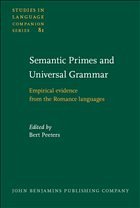Nicht lieferbar

Semantic Primes and Universal Grammar
Empirical evidence from the Romance languages
Versandkostenfrei!
Nicht lieferbar
Main description:This volume is part of a research program which started with the publication, in 1972, of Anna Wierzbicka's groundbreaking work on Semantic Primitives. The first within the program to focus on a number of typologically similar languages, it proposes a French, Spanish, Portuguese and Italian version of the Natural Semantic Metalanguage (NSM) elaborated over the years by Wierzbicka and colleagues. Repetition is avoided through teamwork: a number of authors working on the languages under examination have had equal input in a set of five papers dealing with distinct parts of the m...
Main description:
This volume is part of a research program which started with the publication, in 1972, of Anna Wierzbicka's groundbreaking work on Semantic Primitives. The first within the program to focus on a number of typologically similar languages, it proposes a French, Spanish, Portuguese and Italian version of the Natural Semantic Metalanguage (NSM) elaborated over the years by Wierzbicka and colleagues. Repetition is avoided through teamwork: a number of authors working on the languages under examination have had equal input in a set of five papers dealing with distinct parts of the metalanguage. Some of the findings presented here invite us to have a fresh look at what has already been achieved, and to amend some of the working hypotheses of the NSM approach accordingly. The volume also contains six case studies (on Italian sfogarsi, Portuguese saudades, Spanish crisis, French certes, Spanish expressions of sincerity and Italian and Spanish diminutives, respectively).
Table of contents:
- Acknowledgements
- List of contributors
- List of abbreviations
- Typographical conventions and symbols
- Preface
- Scope and contents of this volume
- The Natural Semantic Metalanguage (NSM) approach
- Part 1: Romance versions of the Natural Semantic Metalanguage
- Natural Semantic Metalanguage exponents and universal grammar in Romance
- Natural Semantic Metalanguage exponents and universal grammar in Romance
- Natural Semantic Metalanguage exponents and universal grammar in Romance
- Natural Semantic Metalanguage exponents and universal grammar in Romance
- Natural Semantic Metalanguage exponents and universal grammar in Romance
- Part 2: The Natural Semantic Metalanguage Applied
- Sfogarsi
- Portuguese saudade and other emotions of absence and longing
- The development of a key word
- The French connector certes
- Francamente, el rojo te sienta fatal
- Towards a description of Spanish and Italian diminutives within the Natural Semantic Metalanguage framework
- Indexes
This volume is part of a research program which started with the publication, in 1972, of Anna Wierzbicka's groundbreaking work on Semantic Primitives. The first within the program to focus on a number of typologically similar languages, it proposes a French, Spanish, Portuguese and Italian version of the Natural Semantic Metalanguage (NSM) elaborated over the years by Wierzbicka and colleagues. Repetition is avoided through teamwork: a number of authors working on the languages under examination have had equal input in a set of five papers dealing with distinct parts of the metalanguage. Some of the findings presented here invite us to have a fresh look at what has already been achieved, and to amend some of the working hypotheses of the NSM approach accordingly. The volume also contains six case studies (on Italian sfogarsi, Portuguese saudades, Spanish crisis, French certes, Spanish expressions of sincerity and Italian and Spanish diminutives, respectively).
Table of contents:
- Acknowledgements
- List of contributors
- List of abbreviations
- Typographical conventions and symbols
- Preface
- Scope and contents of this volume
- The Natural Semantic Metalanguage (NSM) approach
- Part 1: Romance versions of the Natural Semantic Metalanguage
- Natural Semantic Metalanguage exponents and universal grammar in Romance
- Natural Semantic Metalanguage exponents and universal grammar in Romance
- Natural Semantic Metalanguage exponents and universal grammar in Romance
- Natural Semantic Metalanguage exponents and universal grammar in Romance
- Natural Semantic Metalanguage exponents and universal grammar in Romance
- Part 2: The Natural Semantic Metalanguage Applied
- Sfogarsi
- Portuguese saudade and other emotions of absence and longing
- The development of a key word
- The French connector certes
- Francamente, el rojo te sienta fatal
- Towards a description of Spanish and Italian diminutives within the Natural Semantic Metalanguage framework
- Indexes




